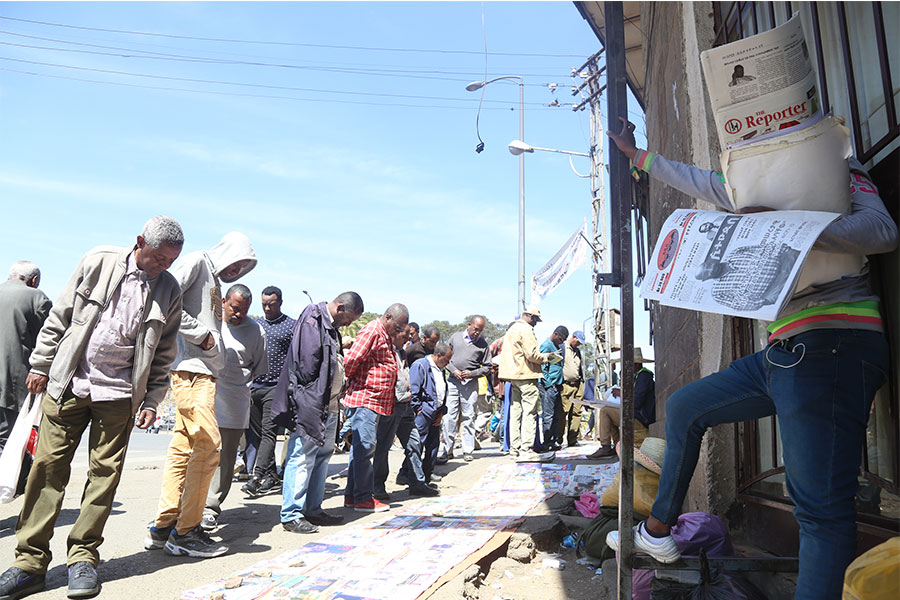
Fortune News | Nov 09,2019
Oct 24 , 2020
By MICHAEL GETASETEGNE
The ban on 16 courier service providers was lifted as of this month following the operationalisation of the new company, Safe Zone Warehousing Plc. The Ethiopian Customs Commission banned the courier service providers in August after citing their lack of warehouse operator licenses.
Established by four courier companies in response to an edict from the Commission concerning the cessation of unlicensed courier services, Safe Zone started providing a warehouse service for the firms. The new warehousing company has rented close to 300Sqm of space from Ethiopian Airlines and has resumed carrying out regular services.
The ban affected UPS, FedEx, Aramex, Marathon Express and ICCS Express along with others. Before the ban, the companies had been operating within the space they rented from International Cargo & Aviation Services (ICAS) at Bole International Airport. However, a year ago when the Airport underwent renovation work, the companies were temporarily moved to an area at the cargo division of Ethiopian Airlines, paying a fee based on the type of cargo they were handling amounting to 10 Br with value-added tax (VAT) a kilogram.
A few days before barring their services, the Commission sent a letter to courier service providers stating that their procedures were against customs laws and that they needed to resolve the issue of warehousing for their items. The Commission stated that this had caused difficulty in the storage and handling of shipments to and from the country.
The letter mentioned that the lack of a designated warehouse operator and a registration and division process has also led to the loss of items and left the industry vulnerable to theft. The letter also disclosed that the courier services would either have to operate using Ethiopian Airline's warehouses or those of another licensed operator and that their current model of service would no longer be allowed to continue.
"We've been requesting that these companies should have one representative legal body that can be held accountable for what is happening in the warehouse," said Teferi Mekonnen, manager at the Addis Abeba Customs Branch Office.
Over the past two months, only German courier DHL and EMS, the designated universal postal service provider and part of the Ethiopian Postal Service, have been operating in their own warehouses.
After the ban, the four companies that established Safe Zone held discussions with Fitsum Abady, managing director of Ethiopian Cargo & Logistics Services, to obtain a letter from the airline that allocates warehousing space to them.
"I'm happy for resuming services," said Mohammed Yusuf, Manager of ICCS Express. "The problem is solved, and we're operating properly now."
Amin Hassen, CEO of HudHud Express, said that the warehousing company should start providing service 24/7.
"To deliver a satisfying service to our customers," said Amin, "the warehouse service should operate round-the-clock."
Courier service companies play a significant role in the economy; unfortunately, the companies were not given due attention, according to Matiwos Ensermu (PhD), associate professor of logistics & supply chain management at Addis Abeba University.
Currently, there are 58 private express courier service providers in the country, of which 51 are actively working.
"They were totally ignored," he said. "They weren't getting land to build a warehouse for courier services unless it's needed for a manufacturing plant. The new National Logistics Policy can potentially address the challenges the sector faces."
The ban on these companies means a lot in the economy since one of the prerequisites to measure the ease of doing business in the country is in terms of such kind of services, according to Matiwos.
PUBLISHED ON
Oct 24,2020 [ VOL
21 , NO
1069]

Fortune News | Nov 09,2019

Radar | Oct 09,2021

Featured | Nov 02,2019

Radar | Mar 27,2021

Agenda | Dec 19,2018

Dec 22 , 2024 . By TIZITA SHEWAFERAW
Charged with transforming colossal state-owned enterprises into modern and competitiv...

Aug 18 , 2024 . By AKSAH ITALO
Although predictable Yonas Zerihun's job in the ride-hailing service is not immune to...

Jul 28 , 2024 . By TIZITA SHEWAFERAW
Unhabitual, perhaps too many, Samuel Gebreyohannes, 38, used to occasionally enjoy a couple of beers at breakfast. However, he recently swit...

Jul 13 , 2024 . By AKSAH ITALO
Investors who rely on tractors, trucks, and field vehicles for commuting, transporting commodities, and f...

Oct 18 , 2025
The political establishment, notably the ruling party and its top brass, has become p...

Oct 11 , 2025
Ladislas Farago, a roving Associated Press (AP) correspondent, arrived in Ethiopia in...

Oct 4 , 2025
Eyob Tekalegn (PhD) had been in the Governor's chair for only weeks when, on Septembe...

Sep 27 , 2025
Four years into an experiment with “shock therapy” in education, the national moo...